Health and Social Care Provisions for People with Disabilities
VerifiedAdded on 2023/04/19
|13
|3640
|287
Essay
AI Summary
This essay critically analyzes health and social care provisions for people with disabilities, particularly within the context of schools. It begins by outlining the barriers and challenges faced by individuals with disabilities, emphasizing the significance of health and social care in addressing these issues. The essay delves into disability studies, exploring the social and medical models and their implications for service delivery. It then examines the application of health and social care provisions in schools, focusing on the role of support groups, educational funding, and the implementation of the social model of disability. The use of Alternative and Augmentative Communication (AAC) is also discussed. The essay highlights the importance of appropriate communication techniques and the need for training teaching staff. It concludes by emphasizing the importance of the social model in health and social care provisions, particularly for children with autism and the need for inclusion policies.
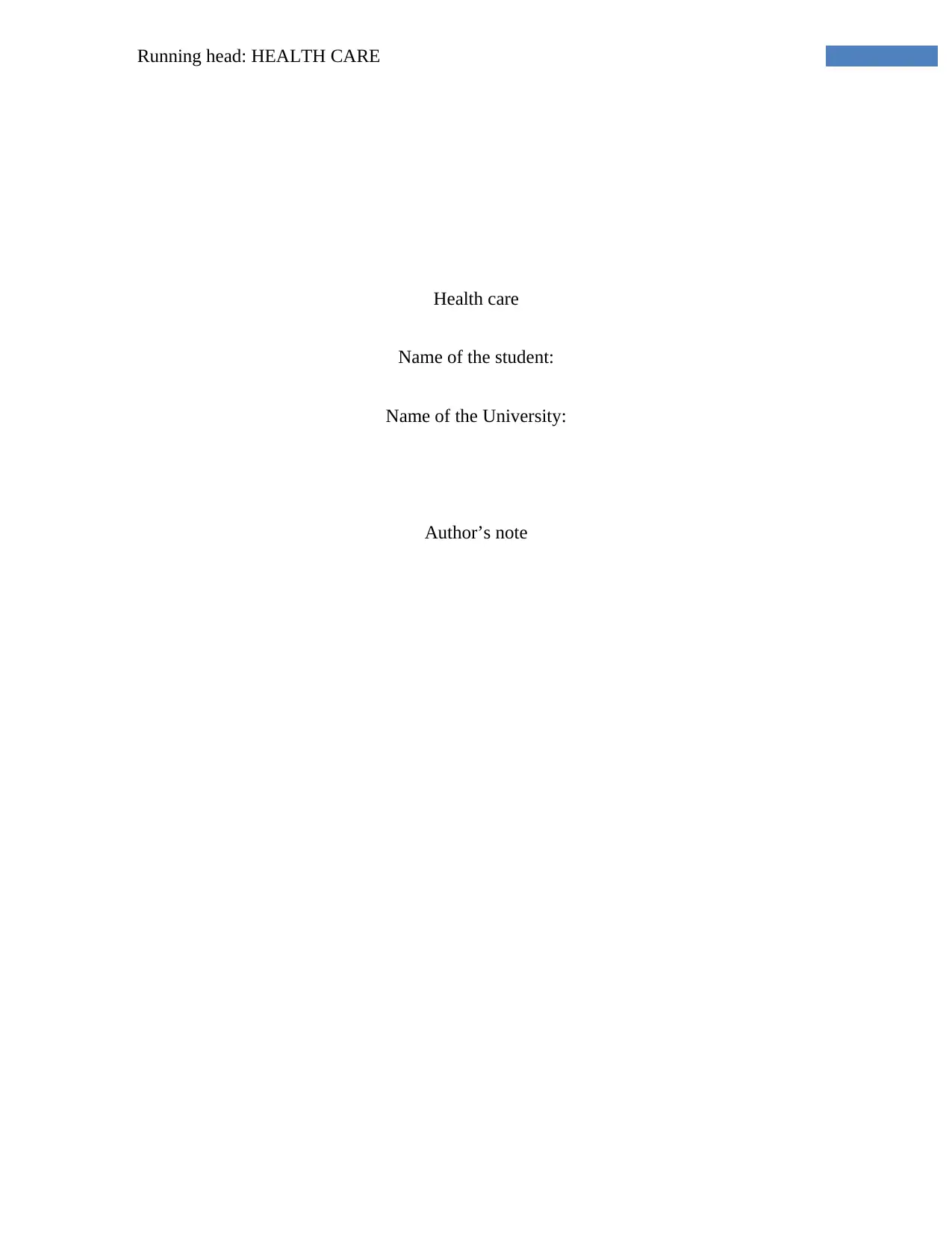
Running head: HEALTH CARE
Health care
Name of the student:
Name of the University:
Author’s note
Health care
Name of the student:
Name of the University:
Author’s note
Paraphrase This Document
Need a fresh take? Get an instant paraphrase of this document with our AI Paraphraser
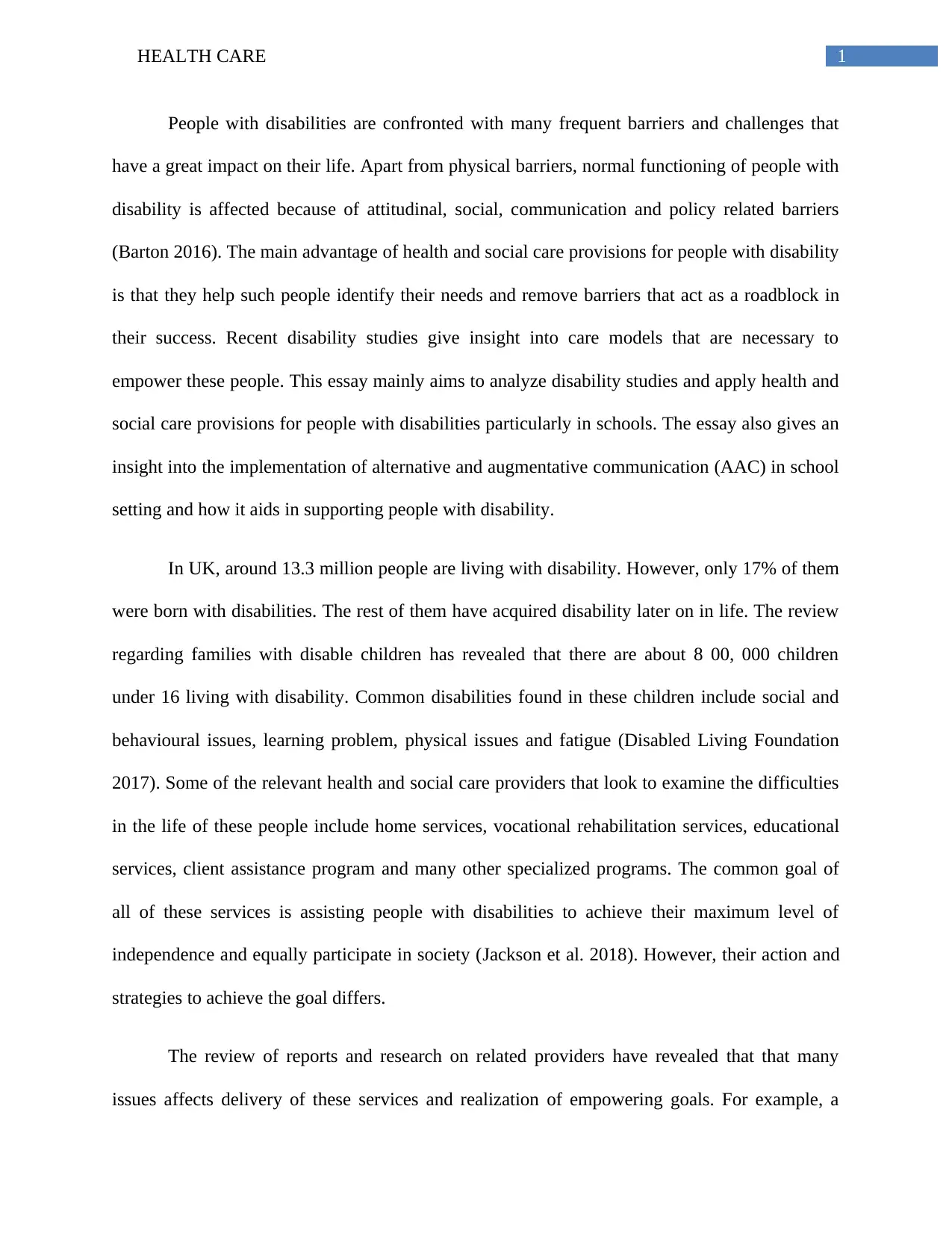
1HEALTH CARE
People with disabilities are confronted with many frequent barriers and challenges that
have a great impact on their life. Apart from physical barriers, normal functioning of people with
disability is affected because of attitudinal, social, communication and policy related barriers
(Barton 2016). The main advantage of health and social care provisions for people with disability
is that they help such people identify their needs and remove barriers that act as a roadblock in
their success. Recent disability studies give insight into care models that are necessary to
empower these people. This essay mainly aims to analyze disability studies and apply health and
social care provisions for people with disabilities particularly in schools. The essay also gives an
insight into the implementation of alternative and augmentative communication (AAC) in school
setting and how it aids in supporting people with disability.
In UK, around 13.3 million people are living with disability. However, only 17% of them
were born with disabilities. The rest of them have acquired disability later on in life. The review
regarding families with disable children has revealed that there are about 8 00, 000 children
under 16 living with disability. Common disabilities found in these children include social and
behavioural issues, learning problem, physical issues and fatigue (Disabled Living Foundation
2017). Some of the relevant health and social care providers that look to examine the difficulties
in the life of these people include home services, vocational rehabilitation services, educational
services, client assistance program and many other specialized programs. The common goal of
all of these services is assisting people with disabilities to achieve their maximum level of
independence and equally participate in society (Jackson et al. 2018). However, their action and
strategies to achieve the goal differs.
The review of reports and research on related providers have revealed that that many
issues affects delivery of these services and realization of empowering goals. For example, a
People with disabilities are confronted with many frequent barriers and challenges that
have a great impact on their life. Apart from physical barriers, normal functioning of people with
disability is affected because of attitudinal, social, communication and policy related barriers
(Barton 2016). The main advantage of health and social care provisions for people with disability
is that they help such people identify their needs and remove barriers that act as a roadblock in
their success. Recent disability studies give insight into care models that are necessary to
empower these people. This essay mainly aims to analyze disability studies and apply health and
social care provisions for people with disabilities particularly in schools. The essay also gives an
insight into the implementation of alternative and augmentative communication (AAC) in school
setting and how it aids in supporting people with disability.
In UK, around 13.3 million people are living with disability. However, only 17% of them
were born with disabilities. The rest of them have acquired disability later on in life. The review
regarding families with disable children has revealed that there are about 8 00, 000 children
under 16 living with disability. Common disabilities found in these children include social and
behavioural issues, learning problem, physical issues and fatigue (Disabled Living Foundation
2017). Some of the relevant health and social care providers that look to examine the difficulties
in the life of these people include home services, vocational rehabilitation services, educational
services, client assistance program and many other specialized programs. The common goal of
all of these services is assisting people with disabilities to achieve their maximum level of
independence and equally participate in society (Jackson et al. 2018). However, their action and
strategies to achieve the goal differs.
The review of reports and research on related providers have revealed that that many
issues affects delivery of these services and realization of empowering goals. For example, a
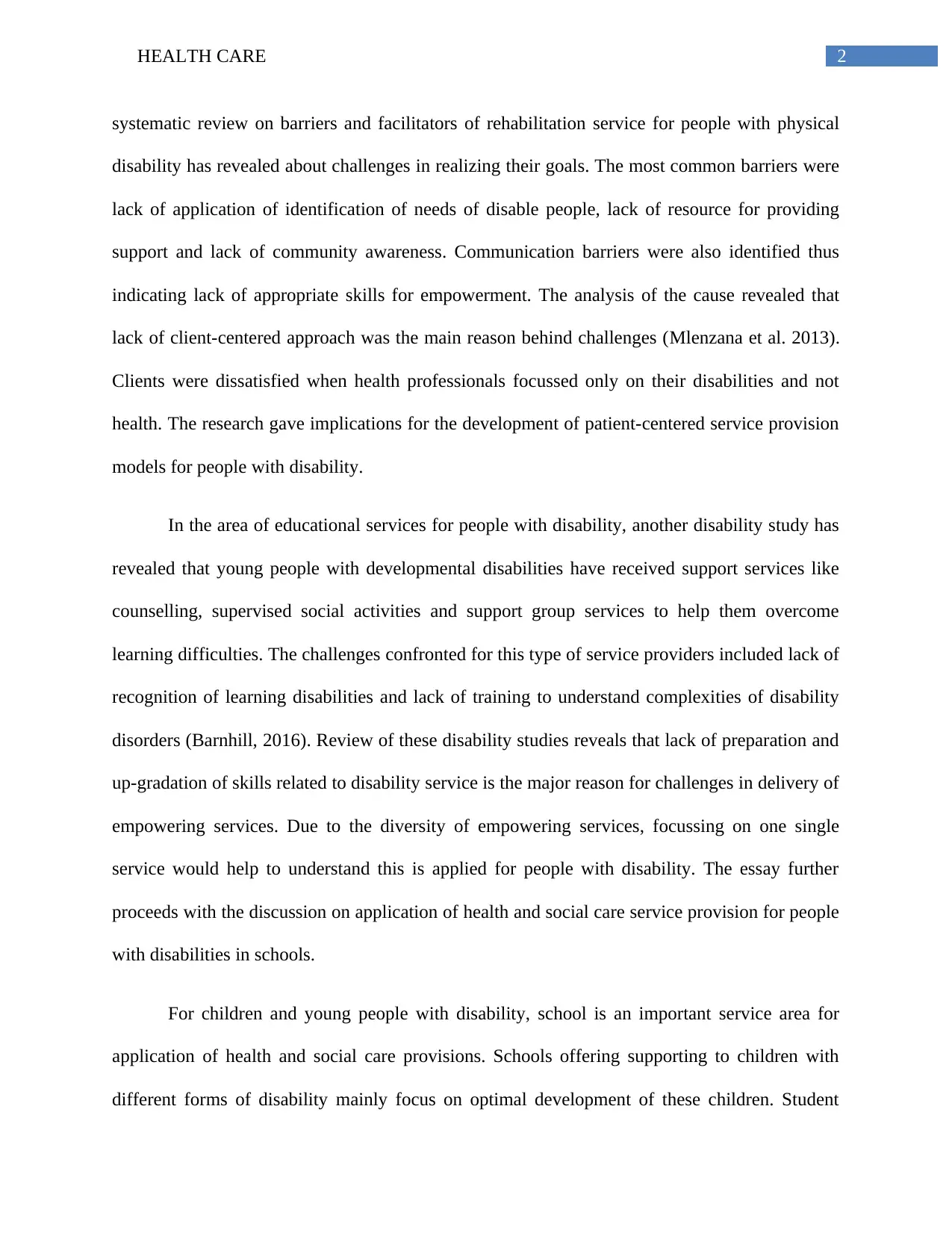
2HEALTH CARE
systematic review on barriers and facilitators of rehabilitation service for people with physical
disability has revealed about challenges in realizing their goals. The most common barriers were
lack of application of identification of needs of disable people, lack of resource for providing
support and lack of community awareness. Communication barriers were also identified thus
indicating lack of appropriate skills for empowerment. The analysis of the cause revealed that
lack of client-centered approach was the main reason behind challenges (Mlenzana et al. 2013).
Clients were dissatisfied when health professionals focussed only on their disabilities and not
health. The research gave implications for the development of patient-centered service provision
models for people with disability.
In the area of educational services for people with disability, another disability study has
revealed that young people with developmental disabilities have received support services like
counselling, supervised social activities and support group services to help them overcome
learning difficulties. The challenges confronted for this type of service providers included lack of
recognition of learning disabilities and lack of training to understand complexities of disability
disorders (Barnhill, 2016). Review of these disability studies reveals that lack of preparation and
up-gradation of skills related to disability service is the major reason for challenges in delivery of
empowering services. Due to the diversity of empowering services, focussing on one single
service would help to understand this is applied for people with disability. The essay further
proceeds with the discussion on application of health and social care service provision for people
with disabilities in schools.
For children and young people with disability, school is an important service area for
application of health and social care provisions. Schools offering supporting to children with
different forms of disability mainly focus on optimal development of these children. Student
systematic review on barriers and facilitators of rehabilitation service for people with physical
disability has revealed about challenges in realizing their goals. The most common barriers were
lack of application of identification of needs of disable people, lack of resource for providing
support and lack of community awareness. Communication barriers were also identified thus
indicating lack of appropriate skills for empowerment. The analysis of the cause revealed that
lack of client-centered approach was the main reason behind challenges (Mlenzana et al. 2013).
Clients were dissatisfied when health professionals focussed only on their disabilities and not
health. The research gave implications for the development of patient-centered service provision
models for people with disability.
In the area of educational services for people with disability, another disability study has
revealed that young people with developmental disabilities have received support services like
counselling, supervised social activities and support group services to help them overcome
learning difficulties. The challenges confronted for this type of service providers included lack of
recognition of learning disabilities and lack of training to understand complexities of disability
disorders (Barnhill, 2016). Review of these disability studies reveals that lack of preparation and
up-gradation of skills related to disability service is the major reason for challenges in delivery of
empowering services. Due to the diversity of empowering services, focussing on one single
service would help to understand this is applied for people with disability. The essay further
proceeds with the discussion on application of health and social care service provision for people
with disabilities in schools.
For children and young people with disability, school is an important service area for
application of health and social care provisions. Schools offering supporting to children with
different forms of disability mainly focus on optimal development of these children. Student
⊘ This is a preview!⊘
Do you want full access?
Subscribe today to unlock all pages.

Trusted by 1+ million students worldwide
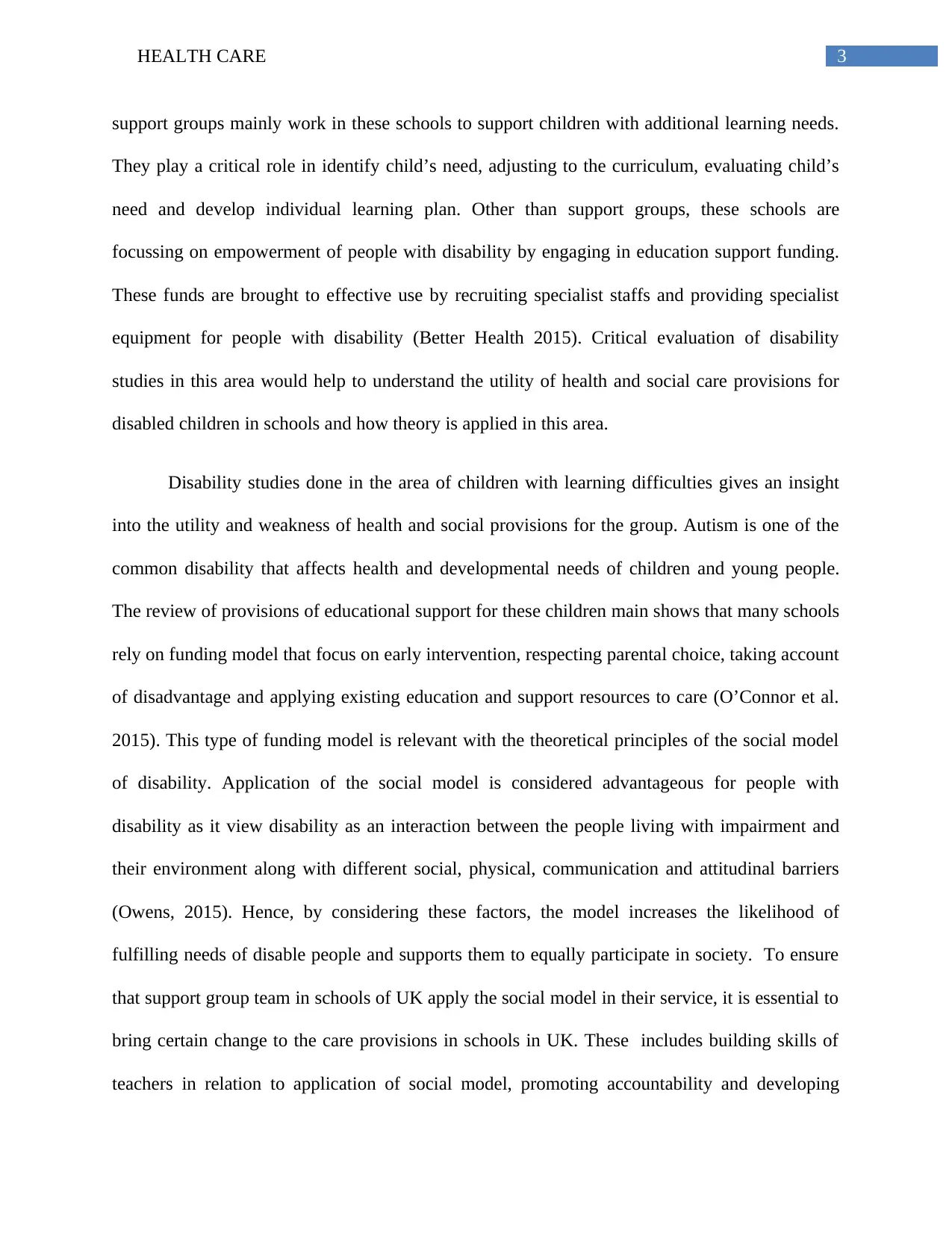
3HEALTH CARE
support groups mainly work in these schools to support children with additional learning needs.
They play a critical role in identify child’s need, adjusting to the curriculum, evaluating child’s
need and develop individual learning plan. Other than support groups, these schools are
focussing on empowerment of people with disability by engaging in education support funding.
These funds are brought to effective use by recruiting specialist staffs and providing specialist
equipment for people with disability (Better Health 2015). Critical evaluation of disability
studies in this area would help to understand the utility of health and social care provisions for
disabled children in schools and how theory is applied in this area.
Disability studies done in the area of children with learning difficulties gives an insight
into the utility and weakness of health and social provisions for the group. Autism is one of the
common disability that affects health and developmental needs of children and young people.
The review of provisions of educational support for these children main shows that many schools
rely on funding model that focus on early intervention, respecting parental choice, taking account
of disadvantage and applying existing education and support resources to care (O’Connor et al.
2015). This type of funding model is relevant with the theoretical principles of the social model
of disability. Application of the social model is considered advantageous for people with
disability as it view disability as an interaction between the people living with impairment and
their environment along with different social, physical, communication and attitudinal barriers
(Owens, 2015). Hence, by considering these factors, the model increases the likelihood of
fulfilling needs of disable people and supports them to equally participate in society. To ensure
that support group team in schools of UK apply the social model in their service, it is essential to
bring certain change to the care provisions in schools in UK. These includes building skills of
teachers in relation to application of social model, promoting accountability and developing
support groups mainly work in these schools to support children with additional learning needs.
They play a critical role in identify child’s need, adjusting to the curriculum, evaluating child’s
need and develop individual learning plan. Other than support groups, these schools are
focussing on empowerment of people with disability by engaging in education support funding.
These funds are brought to effective use by recruiting specialist staffs and providing specialist
equipment for people with disability (Better Health 2015). Critical evaluation of disability
studies in this area would help to understand the utility of health and social care provisions for
disabled children in schools and how theory is applied in this area.
Disability studies done in the area of children with learning difficulties gives an insight
into the utility and weakness of health and social provisions for the group. Autism is one of the
common disability that affects health and developmental needs of children and young people.
The review of provisions of educational support for these children main shows that many schools
rely on funding model that focus on early intervention, respecting parental choice, taking account
of disadvantage and applying existing education and support resources to care (O’Connor et al.
2015). This type of funding model is relevant with the theoretical principles of the social model
of disability. Application of the social model is considered advantageous for people with
disability as it view disability as an interaction between the people living with impairment and
their environment along with different social, physical, communication and attitudinal barriers
(Owens, 2015). Hence, by considering these factors, the model increases the likelihood of
fulfilling needs of disable people and supports them to equally participate in society. To ensure
that support group team in schools of UK apply the social model in their service, it is essential to
bring certain change to the care provisions in schools in UK. These includes building skills of
teachers in relation to application of social model, promoting accountability and developing
Paraphrase This Document
Need a fresh take? Get an instant paraphrase of this document with our AI Paraphraser
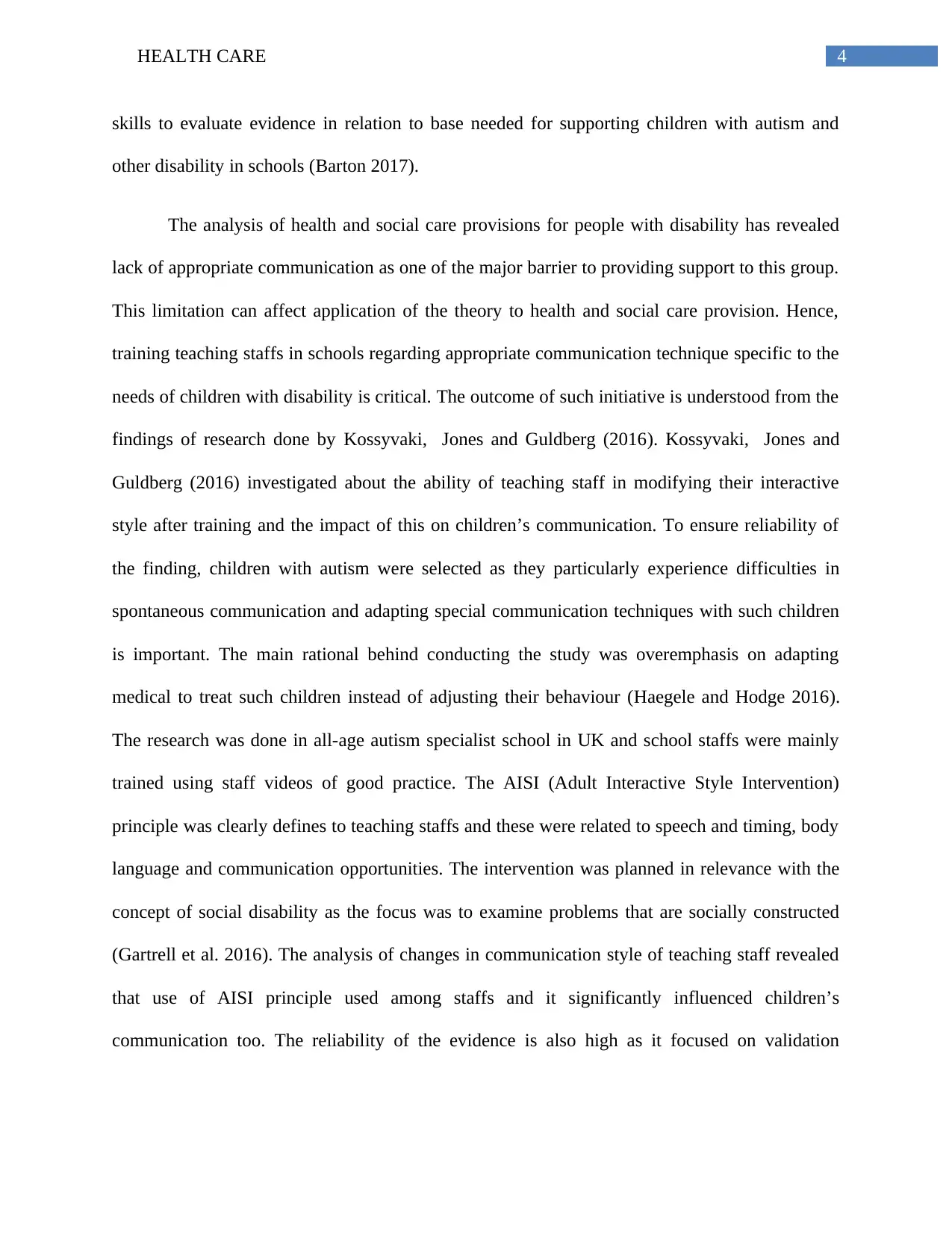
4HEALTH CARE
skills to evaluate evidence in relation to base needed for supporting children with autism and
other disability in schools (Barton 2017).
The analysis of health and social care provisions for people with disability has revealed
lack of appropriate communication as one of the major barrier to providing support to this group.
This limitation can affect application of the theory to health and social care provision. Hence,
training teaching staffs in schools regarding appropriate communication technique specific to the
needs of children with disability is critical. The outcome of such initiative is understood from the
findings of research done by Kossyvaki, Jones and Guldberg (2016). Kossyvaki, Jones and
Guldberg (2016) investigated about the ability of teaching staff in modifying their interactive
style after training and the impact of this on children’s communication. To ensure reliability of
the finding, children with autism were selected as they particularly experience difficulties in
spontaneous communication and adapting special communication techniques with such children
is important. The main rational behind conducting the study was overemphasis on adapting
medical to treat such children instead of adjusting their behaviour (Haegele and Hodge 2016).
The research was done in all-age autism specialist school in UK and school staffs were mainly
trained using staff videos of good practice. The AISI (Adult Interactive Style Intervention)
principle was clearly defines to teaching staffs and these were related to speech and timing, body
language and communication opportunities. The intervention was planned in relevance with the
concept of social disability as the focus was to examine problems that are socially constructed
(Gartrell et al. 2016). The analysis of changes in communication style of teaching staff revealed
that use of AISI principle used among staffs and it significantly influenced children’s
communication too. The reliability of the evidence is also high as it focused on validation
skills to evaluate evidence in relation to base needed for supporting children with autism and
other disability in schools (Barton 2017).
The analysis of health and social care provisions for people with disability has revealed
lack of appropriate communication as one of the major barrier to providing support to this group.
This limitation can affect application of the theory to health and social care provision. Hence,
training teaching staffs in schools regarding appropriate communication technique specific to the
needs of children with disability is critical. The outcome of such initiative is understood from the
findings of research done by Kossyvaki, Jones and Guldberg (2016). Kossyvaki, Jones and
Guldberg (2016) investigated about the ability of teaching staff in modifying their interactive
style after training and the impact of this on children’s communication. To ensure reliability of
the finding, children with autism were selected as they particularly experience difficulties in
spontaneous communication and adapting special communication techniques with such children
is important. The main rational behind conducting the study was overemphasis on adapting
medical to treat such children instead of adjusting their behaviour (Haegele and Hodge 2016).
The research was done in all-age autism specialist school in UK and school staffs were mainly
trained using staff videos of good practice. The AISI (Adult Interactive Style Intervention)
principle was clearly defines to teaching staffs and these were related to speech and timing, body
language and communication opportunities. The intervention was planned in relevance with the
concept of social disability as the focus was to examine problems that are socially constructed
(Gartrell et al. 2016). The analysis of changes in communication style of teaching staff revealed
that use of AISI principle used among staffs and it significantly influenced children’s
communication too. The reliability of the evidence is also high as it focused on validation
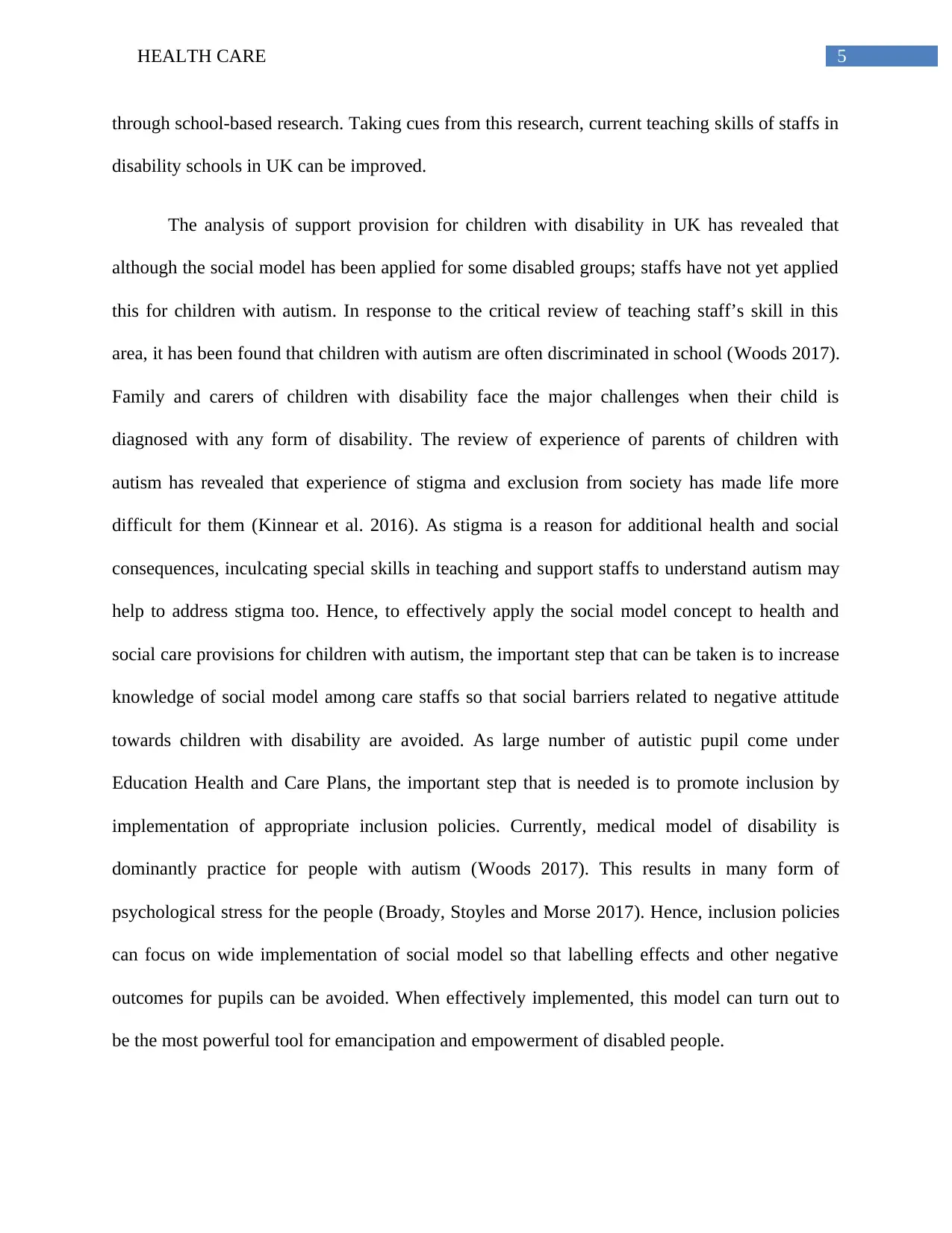
5HEALTH CARE
through school-based research. Taking cues from this research, current teaching skills of staffs in
disability schools in UK can be improved.
The analysis of support provision for children with disability in UK has revealed that
although the social model has been applied for some disabled groups; staffs have not yet applied
this for children with autism. In response to the critical review of teaching staff’s skill in this
area, it has been found that children with autism are often discriminated in school (Woods 2017).
Family and carers of children with disability face the major challenges when their child is
diagnosed with any form of disability. The review of experience of parents of children with
autism has revealed that experience of stigma and exclusion from society has made life more
difficult for them (Kinnear et al. 2016). As stigma is a reason for additional health and social
consequences, inculcating special skills in teaching and support staffs to understand autism may
help to address stigma too. Hence, to effectively apply the social model concept to health and
social care provisions for children with autism, the important step that can be taken is to increase
knowledge of social model among care staffs so that social barriers related to negative attitude
towards children with disability are avoided. As large number of autistic pupil come under
Education Health and Care Plans, the important step that is needed is to promote inclusion by
implementation of appropriate inclusion policies. Currently, medical model of disability is
dominantly practice for people with autism (Woods 2017). This results in many form of
psychological stress for the people (Broady, Stoyles and Morse 2017). Hence, inclusion policies
can focus on wide implementation of social model so that labelling effects and other negative
outcomes for pupils can be avoided. When effectively implemented, this model can turn out to
be the most powerful tool for emancipation and empowerment of disabled people.
through school-based research. Taking cues from this research, current teaching skills of staffs in
disability schools in UK can be improved.
The analysis of support provision for children with disability in UK has revealed that
although the social model has been applied for some disabled groups; staffs have not yet applied
this for children with autism. In response to the critical review of teaching staff’s skill in this
area, it has been found that children with autism are often discriminated in school (Woods 2017).
Family and carers of children with disability face the major challenges when their child is
diagnosed with any form of disability. The review of experience of parents of children with
autism has revealed that experience of stigma and exclusion from society has made life more
difficult for them (Kinnear et al. 2016). As stigma is a reason for additional health and social
consequences, inculcating special skills in teaching and support staffs to understand autism may
help to address stigma too. Hence, to effectively apply the social model concept to health and
social care provisions for children with autism, the important step that can be taken is to increase
knowledge of social model among care staffs so that social barriers related to negative attitude
towards children with disability are avoided. As large number of autistic pupil come under
Education Health and Care Plans, the important step that is needed is to promote inclusion by
implementation of appropriate inclusion policies. Currently, medical model of disability is
dominantly practice for people with autism (Woods 2017). This results in many form of
psychological stress for the people (Broady, Stoyles and Morse 2017). Hence, inclusion policies
can focus on wide implementation of social model so that labelling effects and other negative
outcomes for pupils can be avoided. When effectively implemented, this model can turn out to
be the most powerful tool for emancipation and empowerment of disabled people.
⊘ This is a preview!⊘
Do you want full access?
Subscribe today to unlock all pages.

Trusted by 1+ million students worldwide
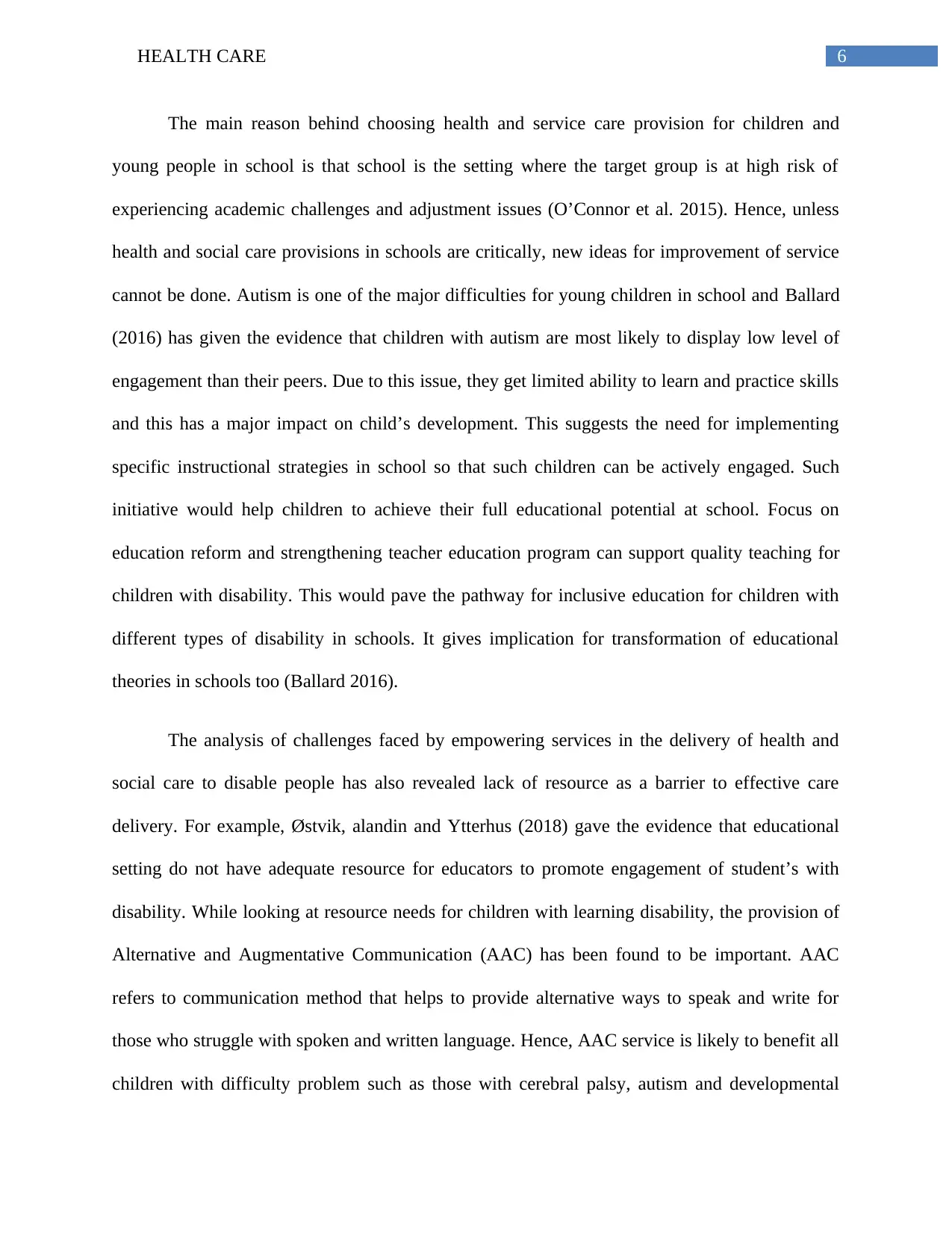
6HEALTH CARE
The main reason behind choosing health and service care provision for children and
young people in school is that school is the setting where the target group is at high risk of
experiencing academic challenges and adjustment issues (O’Connor et al. 2015). Hence, unless
health and social care provisions in schools are critically, new ideas for improvement of service
cannot be done. Autism is one of the major difficulties for young children in school and Ballard
(2016) has given the evidence that children with autism are most likely to display low level of
engagement than their peers. Due to this issue, they get limited ability to learn and practice skills
and this has a major impact on child’s development. This suggests the need for implementing
specific instructional strategies in school so that such children can be actively engaged. Such
initiative would help children to achieve their full educational potential at school. Focus on
education reform and strengthening teacher education program can support quality teaching for
children with disability. This would pave the pathway for inclusive education for children with
different types of disability in schools. It gives implication for transformation of educational
theories in schools too (Ballard 2016).
The analysis of challenges faced by empowering services in the delivery of health and
social care to disable people has also revealed lack of resource as a barrier to effective care
delivery. For example, Østvik, alandin and Ytterhus (2018) gave the evidence that educational
setting do not have adequate resource for educators to promote engagement of student’s with
disability. While looking at resource needs for children with learning disability, the provision of
Alternative and Augmentative Communication (AAC) has been found to be important. AAC
refers to communication method that helps to provide alternative ways to speak and write for
those who struggle with spoken and written language. Hence, AAC service is likely to benefit all
children with difficulty problem such as those with cerebral palsy, autism and developmental
The main reason behind choosing health and service care provision for children and
young people in school is that school is the setting where the target group is at high risk of
experiencing academic challenges and adjustment issues (O’Connor et al. 2015). Hence, unless
health and social care provisions in schools are critically, new ideas for improvement of service
cannot be done. Autism is one of the major difficulties for young children in school and Ballard
(2016) has given the evidence that children with autism are most likely to display low level of
engagement than their peers. Due to this issue, they get limited ability to learn and practice skills
and this has a major impact on child’s development. This suggests the need for implementing
specific instructional strategies in school so that such children can be actively engaged. Such
initiative would help children to achieve their full educational potential at school. Focus on
education reform and strengthening teacher education program can support quality teaching for
children with disability. This would pave the pathway for inclusive education for children with
different types of disability in schools. It gives implication for transformation of educational
theories in schools too (Ballard 2016).
The analysis of challenges faced by empowering services in the delivery of health and
social care to disable people has also revealed lack of resource as a barrier to effective care
delivery. For example, Østvik, alandin and Ytterhus (2018) gave the evidence that educational
setting do not have adequate resource for educators to promote engagement of student’s with
disability. While looking at resource needs for children with learning disability, the provision of
Alternative and Augmentative Communication (AAC) has been found to be important. AAC
refers to communication method that helps to provide alternative ways to speak and write for
those who struggle with spoken and written language. Hence, AAC service is likely to benefit all
children with difficulty problem such as those with cerebral palsy, autism and developmental
Paraphrase This Document
Need a fresh take? Get an instant paraphrase of this document with our AI Paraphraser
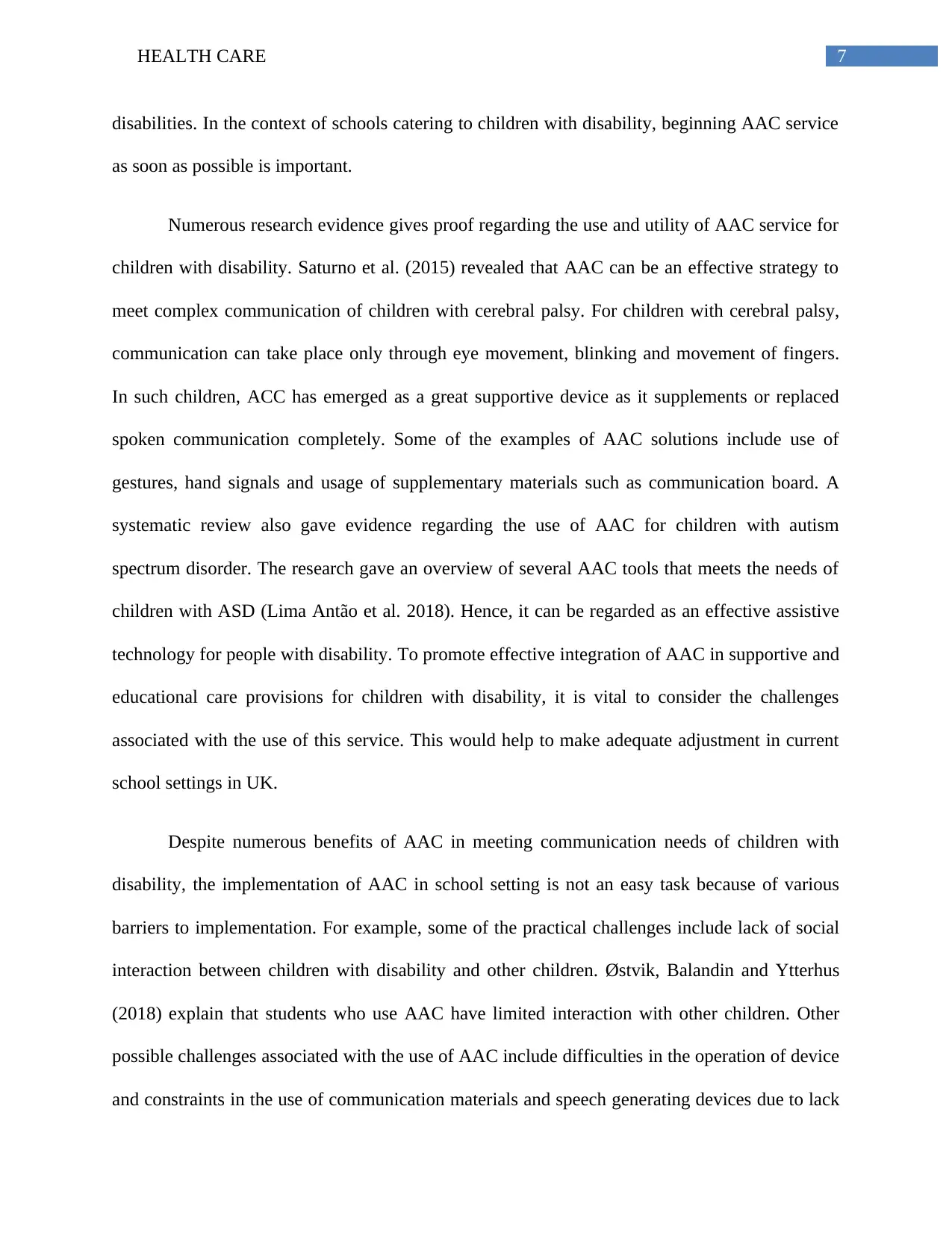
7HEALTH CARE
disabilities. In the context of schools catering to children with disability, beginning AAC service
as soon as possible is important.
Numerous research evidence gives proof regarding the use and utility of AAC service for
children with disability. Saturno et al. (2015) revealed that AAC can be an effective strategy to
meet complex communication of children with cerebral palsy. For children with cerebral palsy,
communication can take place only through eye movement, blinking and movement of fingers.
In such children, ACC has emerged as a great supportive device as it supplements or replaced
spoken communication completely. Some of the examples of AAC solutions include use of
gestures, hand signals and usage of supplementary materials such as communication board. A
systematic review also gave evidence regarding the use of AAC for children with autism
spectrum disorder. The research gave an overview of several AAC tools that meets the needs of
children with ASD (Lima Antão et al. 2018). Hence, it can be regarded as an effective assistive
technology for people with disability. To promote effective integration of AAC in supportive and
educational care provisions for children with disability, it is vital to consider the challenges
associated with the use of this service. This would help to make adequate adjustment in current
school settings in UK.
Despite numerous benefits of AAC in meeting communication needs of children with
disability, the implementation of AAC in school setting is not an easy task because of various
barriers to implementation. For example, some of the practical challenges include lack of social
interaction between children with disability and other children. Østvik, Balandin and Ytterhus
(2018) explain that students who use AAC have limited interaction with other children. Other
possible challenges associated with the use of AAC include difficulties in the operation of device
and constraints in the use of communication materials and speech generating devices due to lack
disabilities. In the context of schools catering to children with disability, beginning AAC service
as soon as possible is important.
Numerous research evidence gives proof regarding the use and utility of AAC service for
children with disability. Saturno et al. (2015) revealed that AAC can be an effective strategy to
meet complex communication of children with cerebral palsy. For children with cerebral palsy,
communication can take place only through eye movement, blinking and movement of fingers.
In such children, ACC has emerged as a great supportive device as it supplements or replaced
spoken communication completely. Some of the examples of AAC solutions include use of
gestures, hand signals and usage of supplementary materials such as communication board. A
systematic review also gave evidence regarding the use of AAC for children with autism
spectrum disorder. The research gave an overview of several AAC tools that meets the needs of
children with ASD (Lima Antão et al. 2018). Hence, it can be regarded as an effective assistive
technology for people with disability. To promote effective integration of AAC in supportive and
educational care provisions for children with disability, it is vital to consider the challenges
associated with the use of this service. This would help to make adequate adjustment in current
school settings in UK.
Despite numerous benefits of AAC in meeting communication needs of children with
disability, the implementation of AAC in school setting is not an easy task because of various
barriers to implementation. For example, some of the practical challenges include lack of social
interaction between children with disability and other children. Østvik, Balandin and Ytterhus
(2018) explain that students who use AAC have limited interaction with other children. Other
possible challenges associated with the use of AAC include difficulties in the operation of device
and constraints in the use of communication materials and speech generating devices due to lack
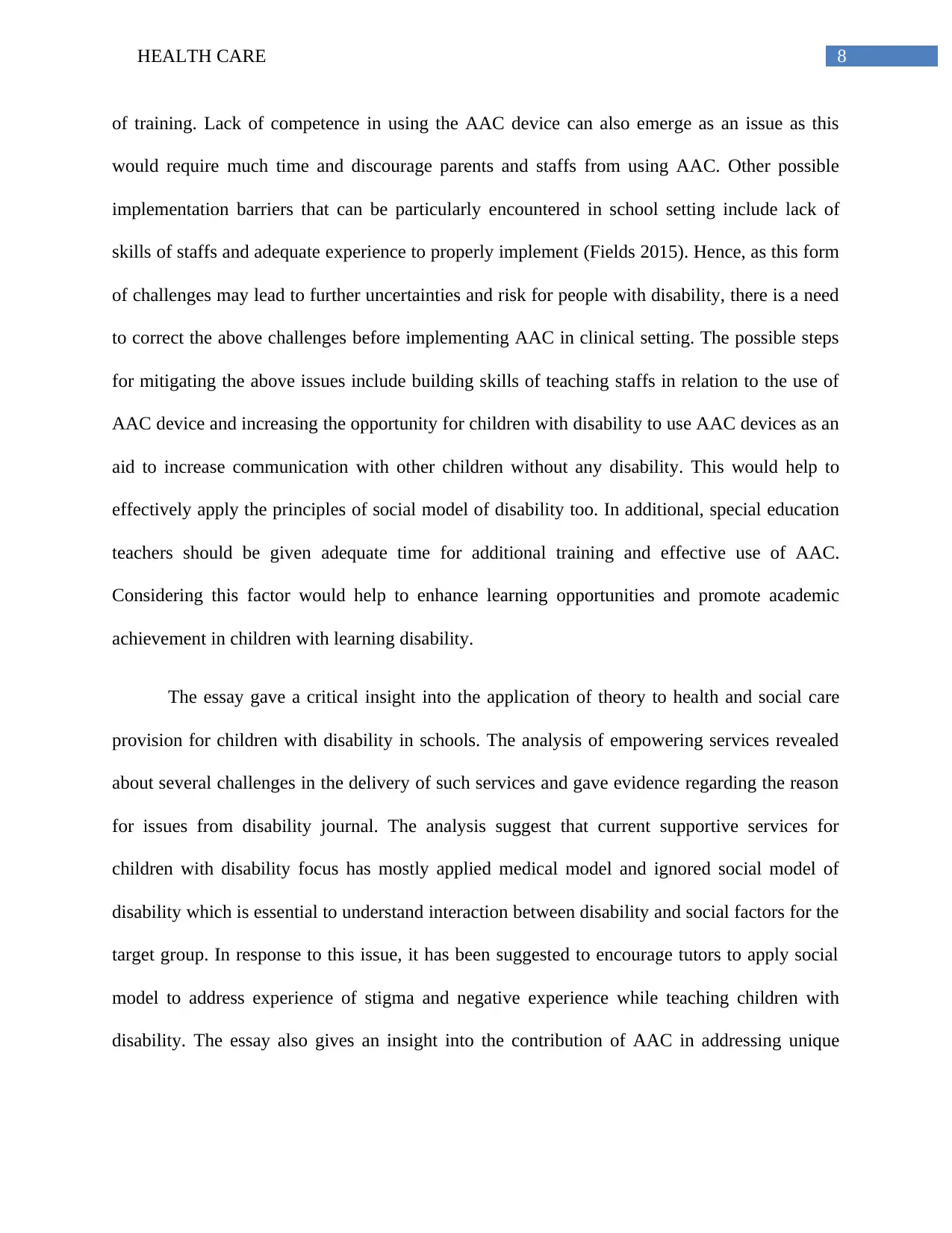
8HEALTH CARE
of training. Lack of competence in using the AAC device can also emerge as an issue as this
would require much time and discourage parents and staffs from using AAC. Other possible
implementation barriers that can be particularly encountered in school setting include lack of
skills of staffs and adequate experience to properly implement (Fields 2015). Hence, as this form
of challenges may lead to further uncertainties and risk for people with disability, there is a need
to correct the above challenges before implementing AAC in clinical setting. The possible steps
for mitigating the above issues include building skills of teaching staffs in relation to the use of
AAC device and increasing the opportunity for children with disability to use AAC devices as an
aid to increase communication with other children without any disability. This would help to
effectively apply the principles of social model of disability too. In additional, special education
teachers should be given adequate time for additional training and effective use of AAC.
Considering this factor would help to enhance learning opportunities and promote academic
achievement in children with learning disability.
The essay gave a critical insight into the application of theory to health and social care
provision for children with disability in schools. The analysis of empowering services revealed
about several challenges in the delivery of such services and gave evidence regarding the reason
for issues from disability journal. The analysis suggest that current supportive services for
children with disability focus has mostly applied medical model and ignored social model of
disability which is essential to understand interaction between disability and social factors for the
target group. In response to this issue, it has been suggested to encourage tutors to apply social
model to address experience of stigma and negative experience while teaching children with
disability. The essay also gives an insight into the contribution of AAC in addressing unique
of training. Lack of competence in using the AAC device can also emerge as an issue as this
would require much time and discourage parents and staffs from using AAC. Other possible
implementation barriers that can be particularly encountered in school setting include lack of
skills of staffs and adequate experience to properly implement (Fields 2015). Hence, as this form
of challenges may lead to further uncertainties and risk for people with disability, there is a need
to correct the above challenges before implementing AAC in clinical setting. The possible steps
for mitigating the above issues include building skills of teaching staffs in relation to the use of
AAC device and increasing the opportunity for children with disability to use AAC devices as an
aid to increase communication with other children without any disability. This would help to
effectively apply the principles of social model of disability too. In additional, special education
teachers should be given adequate time for additional training and effective use of AAC.
Considering this factor would help to enhance learning opportunities and promote academic
achievement in children with learning disability.
The essay gave a critical insight into the application of theory to health and social care
provision for children with disability in schools. The analysis of empowering services revealed
about several challenges in the delivery of such services and gave evidence regarding the reason
for issues from disability journal. The analysis suggest that current supportive services for
children with disability focus has mostly applied medical model and ignored social model of
disability which is essential to understand interaction between disability and social factors for the
target group. In response to this issue, it has been suggested to encourage tutors to apply social
model to address experience of stigma and negative experience while teaching children with
disability. The essay also gives an insight into the contribution of AAC in addressing unique
⊘ This is a preview!⊘
Do you want full access?
Subscribe today to unlock all pages.

Trusted by 1+ million students worldwide
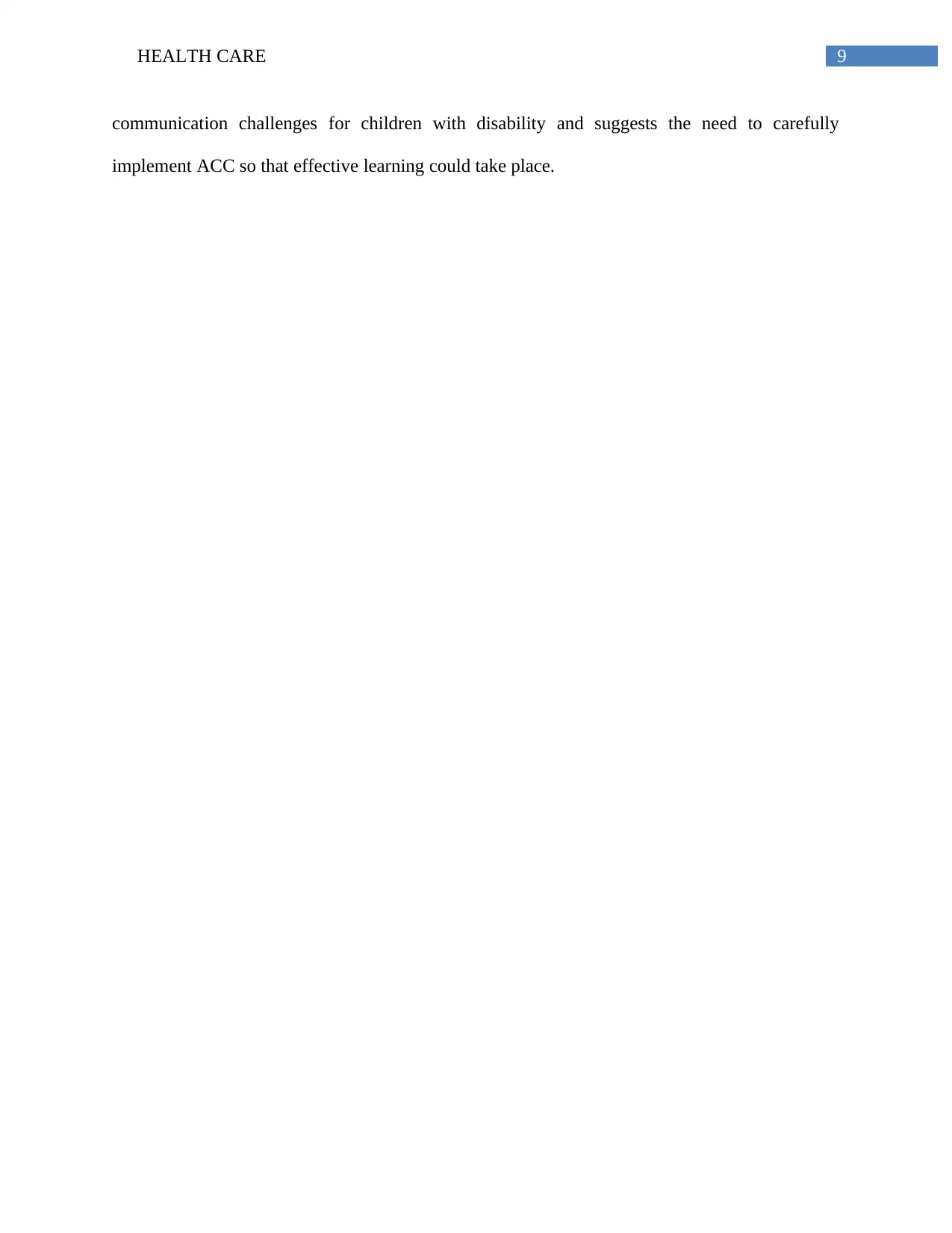
9HEALTH CARE
communication challenges for children with disability and suggests the need to carefully
implement ACC so that effective learning could take place.
communication challenges for children with disability and suggests the need to carefully
implement ACC so that effective learning could take place.
Paraphrase This Document
Need a fresh take? Get an instant paraphrase of this document with our AI Paraphraser
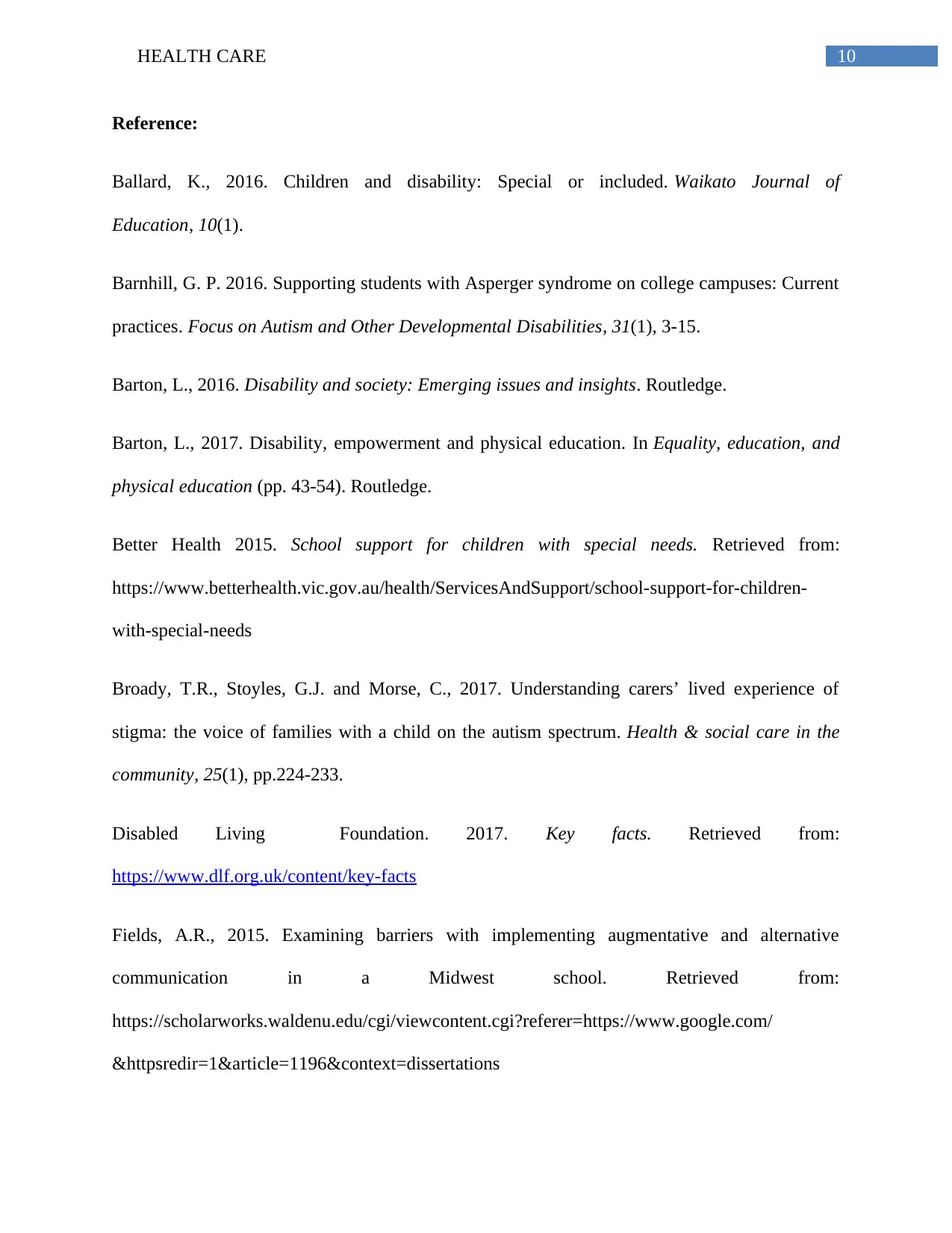
10HEALTH CARE
Reference:
Ballard, K., 2016. Children and disability: Special or included. Waikato Journal of
Education, 10(1).
Barnhill, G. P. 2016. Supporting students with Asperger syndrome on college campuses: Current
practices. Focus on Autism and Other Developmental Disabilities, 31(1), 3-15.
Barton, L., 2016. Disability and society: Emerging issues and insights. Routledge.
Barton, L., 2017. Disability, empowerment and physical education. In Equality, education, and
physical education (pp. 43-54). Routledge.
Better Health 2015. School support for children with special needs. Retrieved from:
https://www.betterhealth.vic.gov.au/health/ServicesAndSupport/school-support-for-children-
with-special-needs
Broady, T.R., Stoyles, G.J. and Morse, C., 2017. Understanding carers’ lived experience of
stigma: the voice of families with a child on the autism spectrum. Health & social care in the
community, 25(1), pp.224-233.
Disabled Living Foundation. 2017. Key facts. Retrieved from:
https://www.dlf.org.uk/content/key-facts
Fields, A.R., 2015. Examining barriers with implementing augmentative and alternative
communication in a Midwest school. Retrieved from:
https://scholarworks.waldenu.edu/cgi/viewcontent.cgi?referer=https://www.google.com/
&httpsredir=1&article=1196&context=dissertations
Reference:
Ballard, K., 2016. Children and disability: Special or included. Waikato Journal of
Education, 10(1).
Barnhill, G. P. 2016. Supporting students with Asperger syndrome on college campuses: Current
practices. Focus on Autism and Other Developmental Disabilities, 31(1), 3-15.
Barton, L., 2016. Disability and society: Emerging issues and insights. Routledge.
Barton, L., 2017. Disability, empowerment and physical education. In Equality, education, and
physical education (pp. 43-54). Routledge.
Better Health 2015. School support for children with special needs. Retrieved from:
https://www.betterhealth.vic.gov.au/health/ServicesAndSupport/school-support-for-children-
with-special-needs
Broady, T.R., Stoyles, G.J. and Morse, C., 2017. Understanding carers’ lived experience of
stigma: the voice of families with a child on the autism spectrum. Health & social care in the
community, 25(1), pp.224-233.
Disabled Living Foundation. 2017. Key facts. Retrieved from:
https://www.dlf.org.uk/content/key-facts
Fields, A.R., 2015. Examining barriers with implementing augmentative and alternative
communication in a Midwest school. Retrieved from:
https://scholarworks.waldenu.edu/cgi/viewcontent.cgi?referer=https://www.google.com/
&httpsredir=1&article=1196&context=dissertations
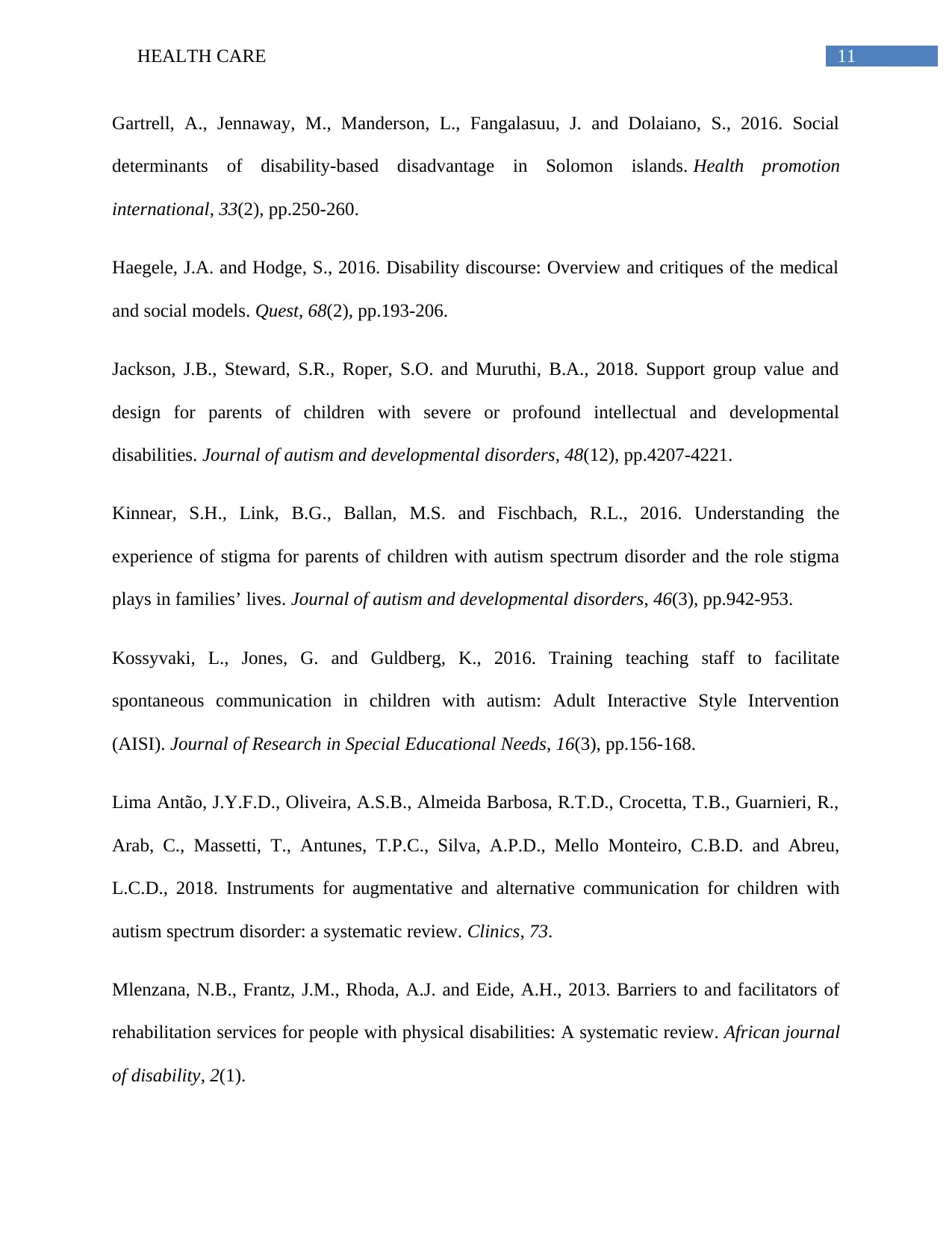
11HEALTH CARE
Gartrell, A., Jennaway, M., Manderson, L., Fangalasuu, J. and Dolaiano, S., 2016. Social
determinants of disability-based disadvantage in Solomon islands. Health promotion
international, 33(2), pp.250-260.
Haegele, J.A. and Hodge, S., 2016. Disability discourse: Overview and critiques of the medical
and social models. Quest, 68(2), pp.193-206.
Jackson, J.B., Steward, S.R., Roper, S.O. and Muruthi, B.A., 2018. Support group value and
design for parents of children with severe or profound intellectual and developmental
disabilities. Journal of autism and developmental disorders, 48(12), pp.4207-4221.
Kinnear, S.H., Link, B.G., Ballan, M.S. and Fischbach, R.L., 2016. Understanding the
experience of stigma for parents of children with autism spectrum disorder and the role stigma
plays in families’ lives. Journal of autism and developmental disorders, 46(3), pp.942-953.
Kossyvaki, L., Jones, G. and Guldberg, K., 2016. Training teaching staff to facilitate
spontaneous communication in children with autism: Adult Interactive Style Intervention
(AISI). Journal of Research in Special Educational Needs, 16(3), pp.156-168.
Lima Antão, J.Y.F.D., Oliveira, A.S.B., Almeida Barbosa, R.T.D., Crocetta, T.B., Guarnieri, R.,
Arab, C., Massetti, T., Antunes, T.P.C., Silva, A.P.D., Mello Monteiro, C.B.D. and Abreu,
L.C.D., 2018. Instruments for augmentative and alternative communication for children with
autism spectrum disorder: a systematic review. Clinics, 73.
Mlenzana, N.B., Frantz, J.M., Rhoda, A.J. and Eide, A.H., 2013. Barriers to and facilitators of
rehabilitation services for people with physical disabilities: A systematic review. African journal
of disability, 2(1).
Gartrell, A., Jennaway, M., Manderson, L., Fangalasuu, J. and Dolaiano, S., 2016. Social
determinants of disability-based disadvantage in Solomon islands. Health promotion
international, 33(2), pp.250-260.
Haegele, J.A. and Hodge, S., 2016. Disability discourse: Overview and critiques of the medical
and social models. Quest, 68(2), pp.193-206.
Jackson, J.B., Steward, S.R., Roper, S.O. and Muruthi, B.A., 2018. Support group value and
design for parents of children with severe or profound intellectual and developmental
disabilities. Journal of autism and developmental disorders, 48(12), pp.4207-4221.
Kinnear, S.H., Link, B.G., Ballan, M.S. and Fischbach, R.L., 2016. Understanding the
experience of stigma for parents of children with autism spectrum disorder and the role stigma
plays in families’ lives. Journal of autism and developmental disorders, 46(3), pp.942-953.
Kossyvaki, L., Jones, G. and Guldberg, K., 2016. Training teaching staff to facilitate
spontaneous communication in children with autism: Adult Interactive Style Intervention
(AISI). Journal of Research in Special Educational Needs, 16(3), pp.156-168.
Lima Antão, J.Y.F.D., Oliveira, A.S.B., Almeida Barbosa, R.T.D., Crocetta, T.B., Guarnieri, R.,
Arab, C., Massetti, T., Antunes, T.P.C., Silva, A.P.D., Mello Monteiro, C.B.D. and Abreu,
L.C.D., 2018. Instruments for augmentative and alternative communication for children with
autism spectrum disorder: a systematic review. Clinics, 73.
Mlenzana, N.B., Frantz, J.M., Rhoda, A.J. and Eide, A.H., 2013. Barriers to and facilitators of
rehabilitation services for people with physical disabilities: A systematic review. African journal
of disability, 2(1).
⊘ This is a preview!⊘
Do you want full access?
Subscribe today to unlock all pages.

Trusted by 1+ million students worldwide
1 out of 13
Related Documents
Your All-in-One AI-Powered Toolkit for Academic Success.
+13062052269
info@desklib.com
Available 24*7 on WhatsApp / Email
![[object Object]](/_next/static/media/star-bottom.7253800d.svg)
Unlock your academic potential
Copyright © 2020–2026 A2Z Services. All Rights Reserved. Developed and managed by ZUCOL.





